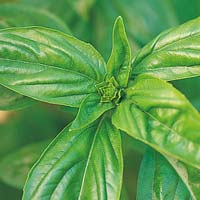Fit and Fast Recipes
Basil
 © Martin Wall
© Martin WallHow It Works
Basil contains a strong-scented volatile oil composed primarily of terpenoids, particularly eugenol, thymol, and estragole. Basil also has what are known as chemotypes, minor variations among plants that contain significantly different mixes of constituents. The exact components of basil oil vary widely, being affected not only by these chemotypes but also by factors such as the time of day of harvest.4 This may account for some of the variability in scientific research and reports of medicinal efficacy of basil from culture to culture.
Preliminary studies on holy basil and hairy basil have shown that the leaf and seed may help people with type 2 diabetes control their blood sugar levels.5, 6, 7 While the action-mechanism of the leaf is not understood, the seed may work by providing dietary fiber, which helps prevent rapid blood sugar elevations after meals. In addition, the seed has been found to relieve constipation by acting as a bulk-forming laxative in one uncontrolled human study.8 A similar study showed the seeds useful in elderly people who experienced constipation after undergoing major surgery.9
The volatile oil of basil has shown antibacterial, antifungal, and antiviral activity in test tube studies.10 It is also believed to act as a carminative, relieving intestinal gas, and as a mild diuretic, though these actions have yet to be definitively proven.11
How to Use It
A tea can be made by steeping 1 teaspoon of basil leaves in one cup of water for ten minutes. Three cups of this tea can be drunk per day. Capsules of basil can be taken in the amount of 2.5 grams per day. The volatile oil can be taken internally in the amount of 2 to 5 drops three times per day.12
Copyright © 2026 TraceGains, Inc. All rights reserved.
Learn more about TraceGains, the company.
The information presented by TraceGains is for informational purposes only. It is based on scientific studies (human, animal, or in vitro), clinical experience, or traditional usage as cited in each article. The results reported may not necessarily occur in all individuals. Self-treatment is not recommended for life-threatening conditions that require medical treatment under a doctor's care. For many of the conditions discussed, treatment with prescription or over the counter medication is also available. Consult your doctor, practitioner, and/or pharmacist for any health problem and before using any supplements or before making any changes in prescribed medications. Information expires December 2026.








